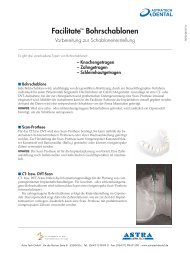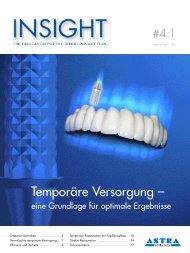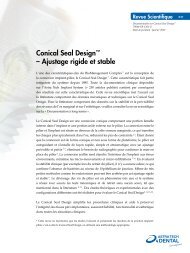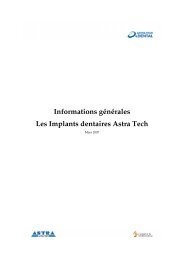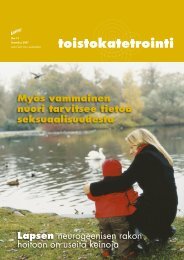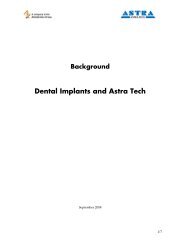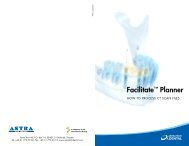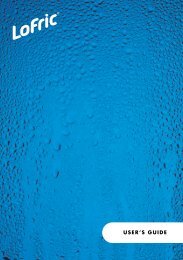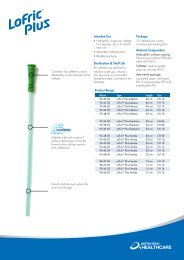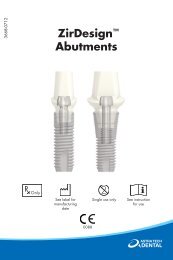Create successful ePaper yourself
Turn your PDF publications into a flip-book with our unique Google optimized e-Paper software.
(contd. from pg. 4)8that cannot store enough urine is usually small andoveractive. This causes the “gotta go” sensation alsoknown as urgency. This can also cause frequent urination– even every few minutes. In addition, the small,overactive bladder can cause the need to go during thenight known as nocturia. A more severe symptom of theinability to store is the loss of control or incontinence.Failure to store is an annoying and sometimes disablingsymptom of MS. Sometimes, fear of a bladder accidentwill cause some to avoid leaving their house for errandsor social activities.Failure to empty urine means that the bladder fills andfills without the correct signal to empty. Eventuallyit cannot stretch or hold any more urine and it mightleak. Some of the symptoms experienced with failure toempty are similar to the small bladder symptoms suchas urgency and frequency. In addition, other symptomsinclude trouble getting urine flow started (hesitancy) anddouble voiding (thinking you have emptied and thenneeding to go again).Sometimes a third type of bladder problem can exist.In this third type the normal coordination of bladdersqueezing and sphincter opening get out of sync.When this happens there can be symptoms of urgency,frequency, and incomplete bladder emptying.A complication of a bladder that will not emptycompletely is a bladder infection; often called a urinarytract infection or UTI. If the urine stays in the bladdertoo long, bacteria can grow and cause an infection.Bladder infections often make other MS symptoms worsetemporarily. Symptoms such as weakness or stiffnessin the limbs are often worse when there is a bladderinfection.Although these bladder problems can be annoying andsignificant problems for many people living with MS,in most cases bladder symptoms can be treated veryeffectively. Sometimes prior to initiating a treatment,specialized testing is necessary to determine the typeof bladder problem, since some of the symptoms canbe similar. Treatment will be different depending ofthe type of storage and emptying problems. If a personwith MS reports a new onset of bladder symptoms, thefirst test that will likely be done is a urinalysis. This isdone to look for infection. A bladder infection (or UTI)can temporarily cause symptoms of urgency, frequency,and hesitancy. Additional symptoms of strong odor ofthe urine, pressure over the lower part of the abdomen,or burning when voiding can also be present with aninfection. Sometimes in MS the only sign that there is abladder infection is the change in MS symptoms. If thereis no bladder infection, a measurement of how muchurine is still in the bladder after voiding will be done.This amount is known as “post-void residual” or PVR.Normally the amount of PVR is less then 100 ml (about3 oz). More then 100 ml is usually a sign of incompleteemptying of the bladder. PVR is measure by placinga tube (catheter) in the bladder after voiding or byperforming an ultrasound of the bladder.More extensive testing called urodynamics can also bedone to determine the bladder diagnosis. This testingis done by a specialist in bladder function, known as aUrologist. Urodynamic testing can be done to determinehow the bladder and sphincter are functioning.Sometimes a simple blood test will also be done to checkthe function of the kidneys.The correct treatment of bladder problems is determinedonce the bladder problem is correctly diagnosed. When asmall, spastic bladder is the problem, often medicationsand diet changes are helpful. Caffeine, alcohol, andartificial sweeteners such as aspartame can irritate thebladder and thus cause additional urgency. There arenumerous prescription medications that reduce the“gotta-go” sensation by reducing bladder spasms. Theseinclude the following medications:- Oxybutinin (Ditropan®)- Tolterodine (Detrol® )- Darefenasin (Enablex®)- Solifenacin succinate (Vesicare®)- Trospium chlonde (Sanctura®)- Flavoxate (Urospas®)It is generally not useful to restrict fluids to correctbladder problems. Too much restriction can actuallycause bladder irritation and make symptoms feel worse.If the urge to void occurs during the night, sometimesstopping fluids after the early evening can be helpful,however, one should not restrict fluids all day long.A bladder that fails to empty or that incompletelyempties may best be helped with intermittent or selfcatheterization.This requires that the individual placea small tube into the bladder one or more times eachday to make sure the bladder is completely empty.Intermittent self-catheterization helps to reduce bladderinfections, and often gives greater confidence for socialac t iv it ie s. A lt houg h no one ge t s to o e xc ite d whe n s el f-



